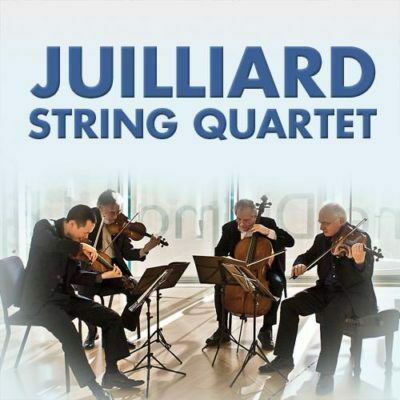Juilliard String Quartet at Ravinia Festival
Joseph Lin, violin
Ronald Copes, violin
Roger Tapping, viola
Joel Krosnick, cello
Bach: Selections from The Art of Fugue, BWV 1080
Berg: Lyric Suite
Beethoven: String Quartet No. 9 in C Major, Op. 59, No. 3 (“Razumovsky”)
The esteemed Juilliard Quartet must be America’s longest-running major chamber ensemble, with a career stretching all the way back to 1946. Today’s lineup is, of course, much younger, although Joel Krosnick has been the quartet’s cellist since 1974. And however one feels about their interpretative sensibility, it cannot be denied that these are serious-minded, virtuosic musicians. Such was evident from the beginning of the opening selections from Bach’s Art of Fugue, marked by refined, somewhat dark-hued tone and graceful phrasing, coupled to a wider vibrato than is usual in Bach. While I am hardly a stickler for playing Bach (or Handel, for that matter) on gut strings with no vibrato, in “period-conscious” fashion, here the vibrato was undeniably somewhat excessive, almost to the point of obscuring Bach’s intricate counterpoint. The Art of Fugue was written with no instrumentation specified, but most likely was conceived in terms of the keyboard, and quartet performances should reflect the clarity of texture one might hear on, say, the harpsichord. Yet the general sensibility and technical security of the Juilliard’s performance created a somewhat stark, somewhat wistful atmosphere that served Bach’s masterful writing well. To my mind, this was the high point of the evening; a pity we were only given the first four Contrapuncti, effectively an appetizer.
Berg’s six-movement Lyric Suite, which followed the Bach, starts off promisingly for an atonal work, managing to be somewhat true to its title – this otherwise highly abrasive music has enough (somewhat) nuanced expression to avert the barbarism of a Bartok, say. Yet I am not sure there is much to actually appreciate in the overall effect achieved in its place, namely a kind of extreme decadence far too sordid and tormented to provide even fleeting enjoyment. Apparently, I am not sophisticated enough to perceive just what the constant use of highly dissonant harmony contributes positively to the substance of the piece; I began to feel nearly sick by the third movement, and there was nothing in the remaining three movements to counteract that sensation. This is by no means incompetent composing, but as plenty of other composers have demonstrated, it is perfectly possible to write challenging, engaging, and inventive music that is not headache-inducing: there is more to true artistic catharsis than relentless abrasion and agonizing, no matter how intricately executed. I have grown grudgingly accustomed to hearing a token modernist piece thrown into the middle of a concert-program to create snob appeal, yet this seemingly endless emotional torture-session proved more than I could stomach. More resilient nerves might have allowed me to better appreciate the technical security and polish the Juilliard brought to bear on what sounds like an incredibly daunting score to play, although I cannot help but ask whether such exercises are not a waste of virtuosity. As in the Bach, vibrato was plentiful; yet even though this is surely closer to the norm in Berg than in Bach, it was during this piece that I gradually began to perceive that the wide vibrato was at times serving to cover up a lack of really vibrant or colorful tone; the effect ultimately became somewhat grating.
Unfortunately, this latter problem affected the performance of Beethoven’s third “Razumovsky” Quartet as well, although again the ensemble as such was perfectly tight. And perhaps I was simply left jaded by the Berg, but in the somewhat tricky first movement I never felt drawn into the music. While I felt more engaged starting from the lovely second-movement Andante, much of the performance felt overwrought and labored, with highly thought-out phrasing delivered very tensely and, again, with heavy vibrato a poor substitute for the lack of warm, full tone. I would have welcomed a more natural and easily flowing sense of expression, even at the cost of the highly polished ensemble the Juilliard achieved. This was less of an issue in the dizzying finale, whose pyrotechnics were dispatched with aplomb. The effect of this movement was electrifying, as the crowd’s reaction attested, but there is more to musicianship than technical virtuosity, as helpful as that can be. In spite of my complaints, this concert did feature extremely well-executed performances of major repertoire, the thanklessly draining Berg notwithstanding. Taking that as a standard, it was a success; I left the hall wishing I had heard something more.
Somewhat recommended.
Samuel Wigutow
Date Reviewed: June 23, 2014

